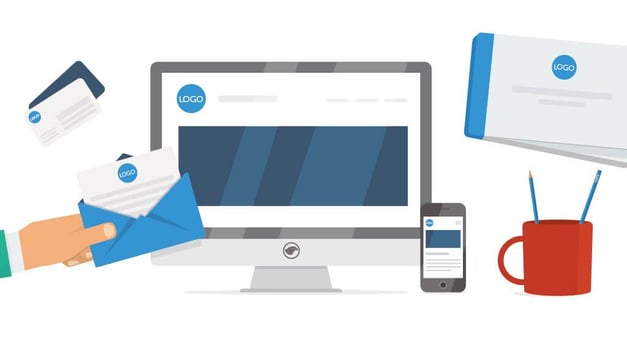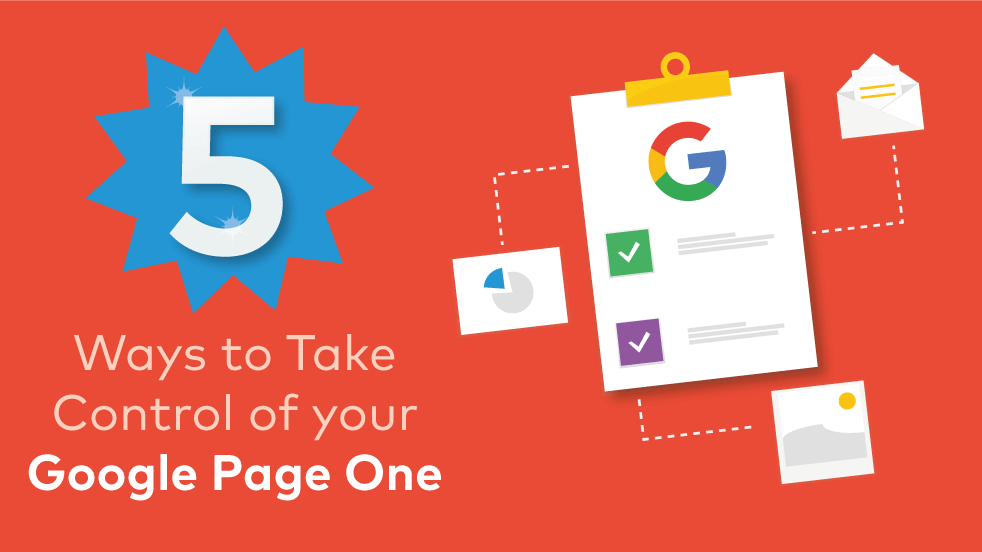As digital becomes an ever more integral part of your marketing strategy, and Google page one becomes the new company brochure, it is becoming increasingly important to populate your Google presence with content that reflects your brand, and with content that you can control.
If your content isn’t populating your Google page one, then someone else’s will be.
Gone are the days when you could build a company website, and stick an advert in the FT. There are an ever-increasing number of digital touchpoints to be considered, from display adverts to social media platforms. If your content isn’t populating your Google page one, then someone else’s will be.
Now, how can you get ahead of the game?
In this article we will explore how you can build your online presence with 5 essential steps.
1. Content

As with all marketing, the content you produce will be the most important factor in building your online presence. On search engines overrun with content, it is crucial you provide your target audience with something unique.
When creating blogs, videos and thought leadership, you might want to think about the themes your audience will be searching for. Then when they are researching a topic, they will see your content appear in their search results. You can have links in and around your content that take them to the relevant service you provide.
You could also host your content on microsites that link back to your website, thereby improving the web rankings of your site. The more quality back links you have leading to your site, the better your search engine ranking.
The more people that read the content on your website, the higher up in the search rankings it will come.
2. Building a website

Your website is the hub of all your online marketing activities. Your content will be hosted on it, and all your digital adverts and social media channels should drive traffic towards it.
Therefore, it is imperative that your website is functional across all devices, easy to navigate and highly searchable.
It is imperative that your website is functional across all devices, easy to navigate and highly searchable.
When it comes to making your website searchable, you need to think about SEO. To achieve a good search engine ranking, you need to make sure that the keywords you use in your website’s content relate to what your investors and clients will be searching for.
Using Google’s Webmaster tools, you can see which search terms are leading people to your site. Using Google’s Keyword Planner can help you strategise which keywords you want your site to rank for. Make sure you place your keywords strategically within your website. The areas that register well with search engines are the URL, headings, the top of the page, the end of a page, anchor text and meta tags.
Include Meta and title tags. Your title tags will help search engines identify the document’s content, and an accurate Meta keyword tag will let search engine spiders know which important keywords to look for. Updating your content regularly will also improve your SEO, as you are letting the search engines know your site is active. Also, make sure your content is around 250 words, as this is what major search engines usually require.
3. Social Media

You can use your social media channels to populate your Google page one. By having Google +, Twitter, Facebook, LinkedIn, Instagram, YouTube, or whichever combination of these best suits your business, you can take control of the content people will see.
By populating these channels with content, and building up their followings, you will improve their search rankings, pushing them onto your Google Page One.
Not only this, but you can promote the content on your website to all your social media followers, driving further traffic to your site. It’s important to include your website URL on all social media profiles, as the more people who click through from your feeds to your website, the better the SEO on both your website and social media platforms.
By adding more online touchpoints, you are creating a funnel that directs people towards your content, products and services.
By adding more online touchpoints, you are creating a funnel that directs people towards your content, products and services. Through your Google account, you can also add your business to Google maps, making it easier to find you.
4. Community building

To develop a strong online presence, you will need to practice community building both online and offline. This will involve connecting with relevant accounts on your social media platforms, and engaging with their content, so that they engage with yours.
Include a contact form on your website and encourage users to leave their email to help you build up your contact database. When building up your database, remember to assess whether you are GDPR ready. Only 5% of firms are compliant, according to a recent survey.
You can also strengthen your online presence, at networking events, by having a Twitter handle, website URL or even a campaign hashtag on the business cards you hand out. The digital equivalent of this would be including social media icons and a website link in your email signature.
Remember, the more effort you put into building your community, the stronger your online presence will become.
5. Digital advertising

There are plenty of options when it comes to digital advertising, all you need to do is decide which of your digital channels you would like to focus on. If you want to build up your social media following, you can run social media campaigns on your platform of choice, putting your content in front of your target audience, and accelerating growth.
There are plenty of options when it comes to digital advertising, all you need to do is decide which of your digital channels you would like to focus on.
If you want to drive traffic to your website, or promote a particular product or service, you can place display ads on websites your audience are likely to visit, run a Google AdWords campaign so you appear in key searches, or run ‘website click’ campaigns on social media that drive your target audience from their social media feed to a page of your choosing, on your website.
Conclusion
Peregrine are experts at helping clients develop their online presence. Our communications team can help you write exceptional content, our design team can build and design the perfect website for your needs, and our in-house digital marketing experts can run all your social media, digital advertising and community building.
On a day to day basis Peregrine can manage all aspects of your online presence to make sure it reflects the strength of your brand.


